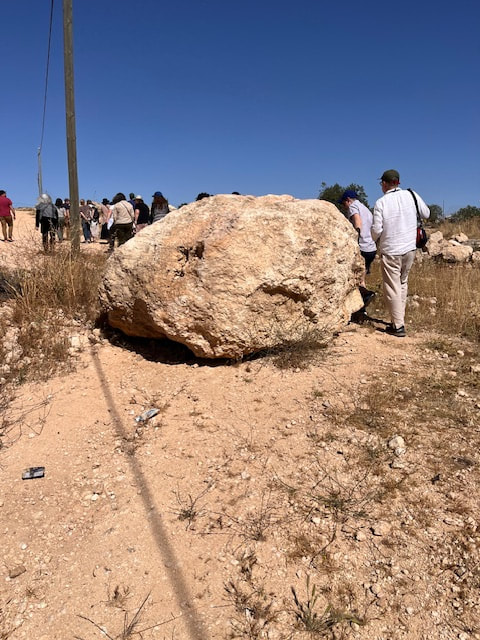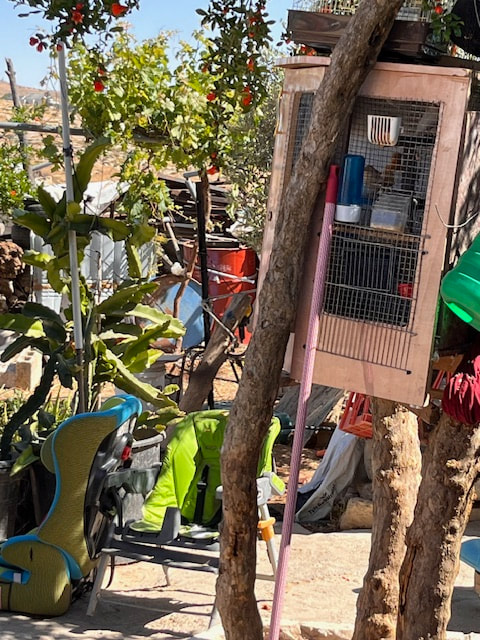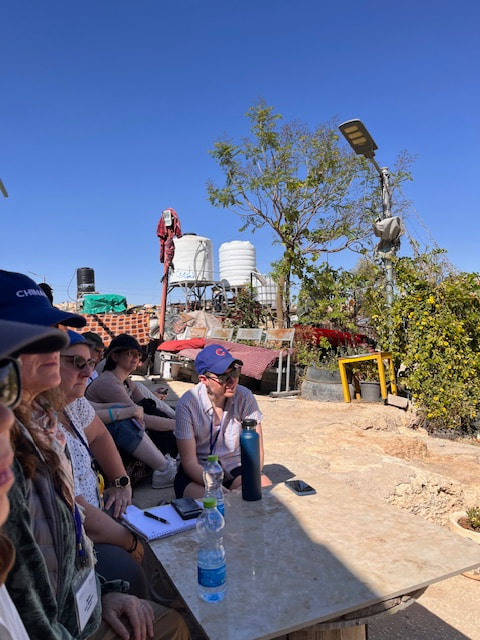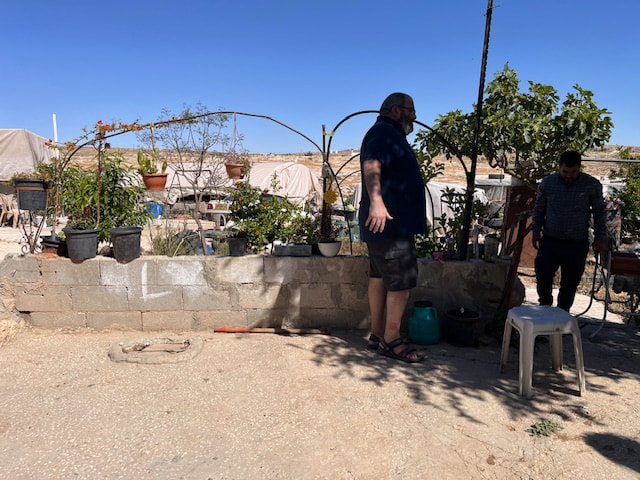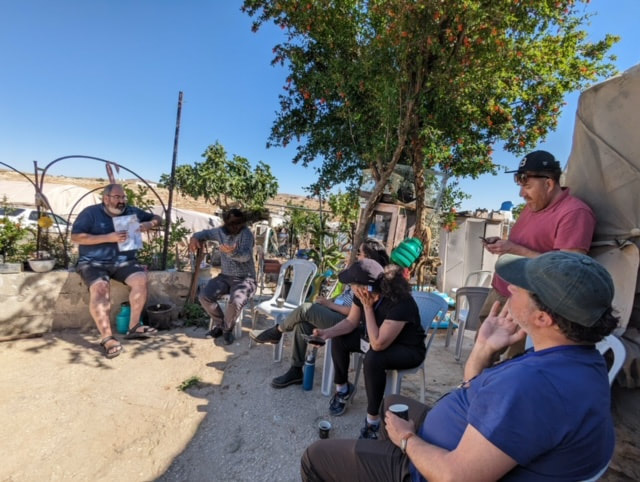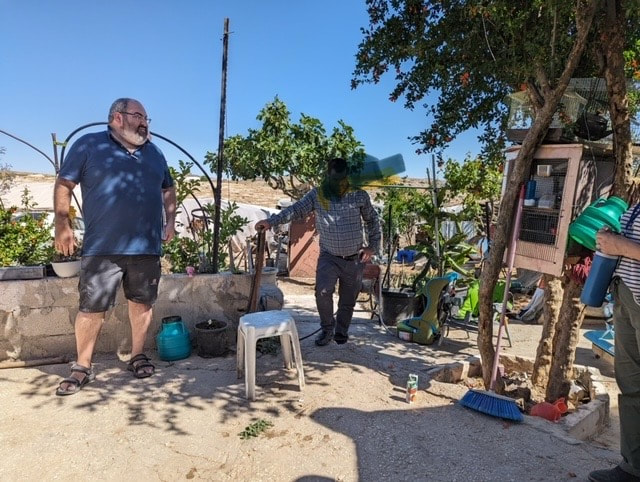Yehudah and Ibrahim
05/13/2024 01:57:39 PM
Rabbi Shoshanah
| Author | |
| Date Added | |
| Automatically create summary | |
| Summary |
On the third day of our trip, two stories inspired me in particular. They are the stories of Yehudah Shaul and Ibrahim (not his real name).
Yehudah Shaul
Among the journeys that we took that day were a trip to the West Bank. Guiding our group throughout the day was Yehudah Shaul. Yehudah’s story is a moving example of how a person can grow and change as we age and learn. It is also an example of courage and leadership.
Yehudah was brought up in Jerusalem in an Orthodox family. As a teen, he studied in a yeshiva based in the West Bank. In 2001, he began his military service. Shaul served as an infantry combat soldier, and eventually he served as a commander during the second intifada. Two of these years he served in the West Bank.
Shaul was following a path that was dutiful, patriotic, and imbued with religious obligation. It is the Israeli path for most. But, during his IDF service, there were things—orders, deeds, and operations—that gave him pause. Some of the things he was required to do seemed, well, less than moral. They ran counter to his understanding of Jewish values. As a soldier, he found no place and no voice for these concerns. A soldier, according to Shaul, might have questions, but you have a team counting on you to perform your part of the operation. Your buddy is going off guard duty at 6:00, and you need to replace him. Life and events in the IDF flowed along, stopping neither for a breath, nor for an ethics discussion.
When Yehudah finished his army service, his concerns did not abate. He wanted to give voice to what felt was wrong about the deeds he had conducted in the military. He got in touch with old commanders and some fellow soldiers, and in speaking with them he learned that he was not the only one who felt uncomfortable—and in fact they, too, believed that much of what they were doing was wrong. Soon after completing his army service, Shaul founded Breaking the Silence.[1]
Breaking the Silence is an organization of Israeli ex-military who engage in activism in support of Palestinians who are unjustly victimized by the Israeli Government and the IDF. Today, Breaking the Silence involves over 1000 soldiers and ex-soldiers fighting against the Occupation.
Shaul could see that the IDF had long ago transformed from an army of defense to an army of occupation. He wanted to be part of an army of defense.
Having stepped away from directorship of BTS in 2019, Shaul continues to support the organization as a board member. Since leaving BTS, together with Dana Golan, Shaul founded Ofek: The Israeli Center for Public Affairs[2], an independent think tank. Their mission is to help advance a peaceful resolution to the Israeli-Palestinian conflict. Here is how he puts it:
We believe that only by ending the Israeli military occupation can the right to self-determination of Israelis and Palestinians alike be realized. Our vision is of two democratic states living side-by-side in peace.
To achieve this end, Ofek performs rigorous research, presents policy solutions, and engages in advocacy in Israel and around the world.
Yehudah was the guide who led us through Khirbat Zenuta and shared with us the background of how the village came to be blocked off by settlers and ultimately decimated by them (see blogpost for May 10).
Ibrahim
With Yehudah as our guide, we also had the honor of meeting Ibrahim. He quietly and humbly welcomed us to the patio outside his house. Yehudah and Ibrahim clearly had worked together and built a relationship over time, and Yehudah acted as our interpreter. We had made our way to Ibrahim’s home on foot, since the giant boulder placed at the head of the road by radical settler Inon Levy (see May 10 post) made driving to the village impossible. Our group sat outside his modest home in his tiny farmyard. There, Ibrahim and his wife were raising their family and trying to make a living. Much like the residents of Khirbat Zenuta, they have struggled for decades against the encroachment on access to their livelihood and growing, daily threats to their safety.
Years ago, one of Ibrahim’s relatives was killed by a Jewish settler. That settler was later killed, and the IDF arrested Ibrahim and a few other young Palestinians. He was seventeen years-old. The arresting officials made him and the others lie face down with their noses on the ground for fifteen hours. They did not allow bathroom breaks, and they did not tolerate the moving of the teens’ heads to the side to breathe. Sometimes they let him up for questioning. He had no knowledge of what had even happened. Eventually, they released Ibrahim and the others as the trail of the investigation moved in a different direction.
As Ibrahim made his way back to his village, he realized that he needed to take an indirect route. He did not want to encounter attacks, intimidation, or violence from Jewish settlers in the area. He took a wide, roundabout path back to his home, only to find that, as he crested the hill, the place where his village was supposed to be had no village. Settlers had destroyed it in his absence.
Ibrahim was seventeen. He and his community were surrounded by a Jewish army who subjected him to torture. He and his community were surrounded by the constant threat of Jewish settler violence and land grabs. And, now, his village was destroyed. The young Ibrahim was prepared to commit to a life of violent resistance.
But, then something unexpected happened. It was something for which he had no previous framework: Jews started showing up in his community with food and supplies. Jewish peace activists and aid workers revealed a Jewishness about justice, compassion, and serving the needs of others.
He had never encountered such a version of Jews or Judaism.
This powerful realization catalyzed Ibrahim to turn away from a path of violence to one of peace activism and partnership with Israelis (like Yehudah) also seeking peace and justice.
It was clear from his farm and home that the family did not have a lot. Life and livelihood are hard, and they are made harder by the pressures from those with more power than this family. A few ducks made noise in the yard. A chicken crossed the patio. There were old pots, gardening equipment, and various vines and small garden plots. And, yet, we felt so welcomed, especially when Ibrahim’s sixteen year-old son, Mohammed silently came around with tiny cups of sweet tea.
Just before we left, Ibrahim ceded the “floor” to Mohammed. This sweet and charming teenager stood before a group of American rabbis and shyly tried his (very good) English. He told us about kids at his high school who had been killed by settlers, and how he has been trying to deal with this trauma among the many he and his family face. He looked like my own child, sitting in class across the ocean. Mohammed wants to come to university in the United States.
As he spoke, I thought back to the horrible incident Ibrahim described from when he was seventeen. I thought about how Jews showed up to support and help him. I thought about how these deeds changed the trajectory of his life. I thought about how this young man in front of us may never have existed had his father chosen the obvious path of violence.
[1] Breaking the Silence
[2] Ofek (ofekcenter.org.il)
Sun, July 7 2024
1 Tammuz 5784


